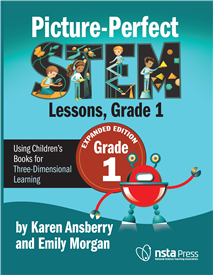All Resources
Lesson Plan
Web Seminar
In this web seminar, the presenters share how an Engineering for Sustainable Communities (EfSC) approach in the middle grades can foster critical consciousness and support strong connections between classrooms and communities. The presenters show how...
Web Seminar
Have you wanted to implement a Project-Based Learning unit in your classroom? Would you like to introduce PBL curriculum in your school? Multiple Literacies in Project-Based Learning (ML-PBL), an Open Education Resource, provides interdisciplin...
Web Seminar
Have you wanted to implement a Project-Based Learning unit in your classroom? Would you like to introduce PBL curriculum in your school? Multiple Literacies in Project-Based Learning (ML-PBL), an Open Education Resource, provides interdisciplin...
Web Seminar
Archive: Exploration Generation: Sensemaking in Rocketry, November 9, 2022
This web seminar will introduce teachers to the Exploration Generation Middle School Playlist and Unit Plan. These instructional materials provide equitable STEM experiences to students and increase educator confidence in teaching rocketry. Explore c...
Journal Article
Using Reflective Thinking to Learn About Relative Distances of Solar System Objects
By Sissy S. Wong
Journal Article
Teaching Plate Tectonics to Diverse Students Using the 5E and 5R Instructional Model
By Naomi Gutierrez, Molly H. Weinburgh, and Cecilia Silva
Journal Article
By Katie Murano, Jesse Wilcox, Jaclyn Easter, and Cat Lucht
Journal Article
“It's Okay That You Add Your Touch”: Fostering Imagining and Creating Through STEAM Education
By Megan McKinley-Hicks, Ariella F. Suchow, Kadahj A. Bennett, Lyndsay Allyn Cox, Genelle Faulkner, Meghan Hill, Michael Barnett, and Helen Zhang
Journal Article
High School Science and Engineering Fairs: Lessons Learned
By Frederick Grinnell and Simon Dalley
Journal Article
By Jessica Wardlaw, Ana Benavides-Lahnstein, Lucy Robinson, Julia Lorke, Sasha Pratt-Taweh, Maryam Ghadiri Khanaposhtani, Heidi Ballard, and Victoria Burton
Journal
Connected Science Learning September–October 2022
Volume 4, Issue 5 Place-Based Learning ...
Journal Article
Engaging Students in Scientific Practices With the Notebooks of Alexander Graham Bell
By Peter DeCraene
Journal Article
Career of the Month: Astronomer
Astronomers study objects that are outside of the Earth’s realm, such as stars, planets, comets, and galaxies. Chris Carilli is an astronomer at the National Radio Astronomy Observatory (NRAO), which operates the National Science Foundation’s Kar...
By Luba Vangelova
Journal Article
By Anna Kiley, David Jones, Carolyn Hester, Michael Coe, and Tony Ward
Journal Article
CCE For Me: Students Demand High-Quality Climate Change Course Offerings
By Timothy E. Muhich and Richard B. Rood
Journal Article
Using Adapted Primary Literature in the Science Classroom
By Miranda Wilson and Tanya Dimitrova
Journal Article
Migrating Beyond the Classroom
By Michelle Monette, Jeffrey Brewster, Nicole Lalier, Joy Pires, and Theodora Pinou
Journal Article
By Melinda Hammerschmidt, Rebecca Crowder Dischner, and Dea Borneman
Journal Article
Q: Do you have a weather-related activity that my students would enjoy?
By Matt Bobrowsky




